Statement by the President of the Republic of Tajikistan H.E. Mr. Emomali Rahmon at the 72nd session of the United Nations General Assembly
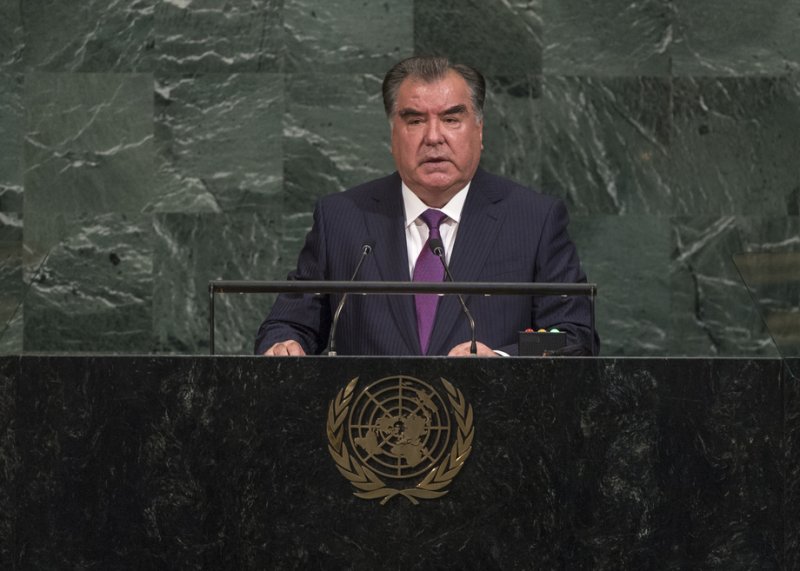
Mr. President,
Mr. Secretary-General,
Distinguished delegates,
Ladies and gentlemen,
I at the outset wish to join my colleagues – heads of states and governments in congratulating Mr. Miroslav Lajcak on his election as the President of the 72nd session of the UN General Assembly and wish him every bit of luck in his most noble duties.
May I also express my sincere appreciation to Mr. Peter Thomson for his continuous support of Tajikistan’s national and international commitments during his tenure of Presidency at the 71st session of the UN General Assembly.
An unprecedented rapid process of globalization over the past decades has contributed to the development of political and economic relations among the countries, helped to bolster integration of different regions across the world. It has however brought massive challenges to the people of the planet.
It sometimes jeopardizes efforts the UN member states exert to guarantee a safe, fair and secure life for the people.
In this context, the United Nations, as a universal institution should continue carrying out its noble mission in coordinating efforts of the member states to build up resilience of countries to respond to the modern threats and challenges.
Mr. President,
It is impossible to address new challenges the international community is facing without strengthening and reforming the entire UN system.
The comprehensive, inclusive reform of the UN should contribute to building up and strengthening its capacity to timely and adequately respond to developments around the world and cope with today’s threats and risks.
The principles of the UN reform should be implemented in compliance and harmony with the principles and goals of the UN Charter, noticing the UN Security Council as its main body.
We do support inclusive and equal representation of interests of developing countries in the process of the Security Council’s reform.
Distinguished participants,
We today are witnessing many tragic and horrific events taking place across the globe threatening international community’s commitments to bring in overall sustainable development.
The spread of terrorism and extremism, religious armed conflicts, transnational organized crime and drug trafficking are posing serious risks on security of our countries.
As terrorist and extremist groups and radical movements are flourishing in many hot spots of the world using different areas and corners as heaven soil threaten the security of all the people.
I wish to reiterate that horror and brutal acts of these forces have no connections with the holy religion of Islam. They are on the contrary against moral teachings, principles of tolerance and recognizing no human values of Islam.
Confronting these threats requires from all UN member states to take stupendous and concerted efforts in compliance with the international law and to refrain from application of double standards.
The Government of Tajikistan in cooperation with its partners and international organizations, particularly the relevant UN agencies, continues taking specific measures to address threats and challenges, and to ensure enduring peace and overall stability in the country.
Implementation of the second phase of Tajikistan’s National Strategy 2020 on Counter-Terrorism and Extremism is one of the instruments we use to carry out our commitments.
I would like to emphasize United Nations central and coordinating role in addressing conflicts wherever they are and its help and support in post-conflict rehabilitation efforts of countries.
The success of our joint actions we undertake to prevent and resolve conflicts, to seek for peaceful ways of settlement of crises and disputes, primarily depends on how effectively we use the instruments of preventive diplomacy and mediation.
In this connection, Republic of Tajikistan has expressed its support to the statements made by international community with regard to the nuclear tests conducted by the Democratic People’s Republic of Korea and call on DPRK to implement diligently relevant UN Security Council resolutions and spoke in favor of continuation of the negotiations within the format of six party talks. This issue can be resolved through only peaceful means and inclusive negotiations.
We consider peace and stability as a guarantee of sustainable social and economic development, deserved and peaceful life, creating friendly conditions for the strong civil society and the observance and protection of human rights in each of the UN member-states which would help countries to thrive.
We, the Tajik people, are well aware of the value of peace and the need to defend it, since we suffered from rough time of a civil war in the first years of our independence, when imposed domestic conflict claimed lives of thousands of citizens of our country.
Only through bringing peace and stability in the society we had been able to achieve sustainable economic development, reduce poverty and improve people’s living standards, promote productive cooperation aimed at development with countries and goodwill nations from all over the world and take bold steps to ensure regional integration.
Mr. Chairman,
We cannot ourselves to stand still and do nothing looking at how military, political and socio-economic situation in the neighboring Afghanistan is going on.
Intensely growing activity of violent terrorist groups in this country has become a reason of our deep concern.
Given the current situation in the country, it is high time to take strong measures to coordinate efforts aimed at combating terrorism, fighting drug production and trafficking in narcotics.
Tajikistan supports Afghanistan’s comprehensive Conflict Resolution Strategy.
At this current juncture, the Government and the people of Afghanistan, particularly in a transition decade, need timely support and targeted assistance.
Afghanistan’s involvement into the process of regional integration through enhanced economic and trade relationships with this country could be an important element which helps the country move forward towards peace and stability.
We call on the international community to stand together and contribute to Afghanistan’s efforts to restore its social and economic life and develope transport and communication infrastructure.
Tajikistan, which shares over 1400 kilometers of border with Afghanistan, is ready and committed to contribute to this noble objective.
Transport and road connectivity of both countries, implementation of power transmission lines’ projects, including CASA-1000, as well as training and professional development of experts in different areas are among the works what we have done and are doing for this country.
Fighting drug trafficking, which is one of the main sources of funding international terrorism, needs joint efforts and firm determination of the international community, including international and regional organizations to help the country get rid of this evil.
Tajikistan has established efficient cooperation with the relevant UN agencies, regional organizations, as well as with partner countries at the bilateral level and has made significant progress in this field.
We are currently successfully implementing in the country the National Strategy on Counter Narcotics 2020.
Mr. Chair,
Adoption of 2030 Agenda by the international community is a key milestone for us to work together to advance sustainable development and involve all sectors of society in this process.
Tajikistan over the past few years has made a great stride towards implementation of Sustainable Development Goals.
The Government of the Republic of Tajikistan, in cooperation with the relevant UN agencies has developed and adopted Mid-Term Development Strategy 2020 and National Development Strategy 2030.
These strategies have been developed in line with the global agenda on sustainable development, and we believe their timely and effective implementation will contribute to achieve Sustainable Development Agenda.
Tajikistan was among the 44 countries which presented their Voluntary National Review this July during the High Level Political Forum on Sustainable Development.
To ensure successful implementation of Agenda 2030 it is necessary to help least developed and developing countries, particularly through providing financial support and cutting-edge technologies. In our view, increasing Official Development Assistance will remain one of the main topics of the day.
It is worth mentioning, that geographical location of land locked developing countries and their lack of access to the seaports poses serious obstacles ahead of their commitments they pledged towards achieving sustainable development. It has become an obvious, that shared development is impossible without adoption and implementation of the development programs in all regions.
Under such circumstances, these countries need much more assistance of developed countries and international financial institutions in their efforts to ensure infrastructure development, help them improve transit transport systems, simplify trade policies and promote regional integration.
We in this connection call upon developed countries and international organizations to ensure rights and friendly environment for labor migrants in receiving states and support the countries of origin in creating new jobs.
In this context, UN bodies, especially Economic and Social Council can and should play an important role.
We do believe that as much attention we give to the economic, social and environmental issues, as better we contribute to a successful and merit implementation of the 2030 Agenda.
Ladies and gentlemen,
We, the representatives of the international community, adopted the Paris Agreement on Climate Change two years ago.
Goals enshrined in this critical document determines major obligations and efforts of the international community in reducing carbon dioxide emissions to the atmosphere, adaptation to the climate change and transition to a low-carbon economy.
With its 93% of its territory covered by mountains, Tajikistan, due to its geographical location, faces the destructive consequences of climate change and natural disasters.
Every year the country suffers from natural disasters, including those related to water that cause damage to our economy, amounting hundreds of millions US dollars and claim human lives.
Climate change accelerates melting of glaciers that brings about the rise of water level in rivers, which, in its turn, has a negative impact on the real sectors of national economy, particularly hydro energy, agriculture and industry.
In Tajikistan over the last 30 years, more than 1,000 glaciers out of the total 13 thousand have entirely vanished as a result of climate change and rise in temperature.
And this happens at the time when Tajikistan’s might from the point of view of its industrial capability — which is the main source of carbon dioxide emission – is not that huge and 98% of the country’s energy is produced at hydropower stations – generating environmentally friendly energy.
Over 60% of Central Asia water resources is currently formed in the territory of Tajikistan.
It is obvious that accelerated melting of glaciers adversely affects the process of water resources formation in the region.
In this regard, the time has come for us to translate words into actions and by demonstrating resolve determination implement the goals of the Paris Climate Agreement.
Meanwhile, Tajikistan has adopted its National Development Strategy for Adaptation to Climate Change which is based on the concept and principles of the Paris Agreement.
In our opinion, one of the ways to achieve the goals of the Paris Agreement on Climate Change is to adhere to the recommendation of the «green» economy and promote comprehensive use of renewable energy sources.
We in this context express our full support to the international initiative «Sustainable Energy for All» and the International Decade «Sustainable Energy for All 2014- 2024».
It is important for the international community to make vibrant efforts to achieve these goals.
Mr. President,
Tajikistan is strongly committed to continue its contribution to an implementation of the UN Water Agenda.
I with great delight note that in December 2016, the UN General Assembly adopted by consensus the Resolution entitled “International Decade of Action “Water for Sustainable Development 2018-2028”.
We do believe that an implementation of the new Decade at the national, regional and international levels will contribute to the achievement of the sustainable development goals related to water and help to preserve this invaluable resource for the future generations.
We this morning have conducted a High – Level Side Event entitled “Towards Implementation of the International Decade of Action “Water for Sustainable Development 2018-2028” where participants exchanged views on ways and mechanisms of an implementation of the new International Decade and SDG-6.
Furthermore, in order to review and deliberate on proposals of development partners and with the view of adopting a roadmap of a decade, we intend to organize in New York on the World Water Day, 22 March 2018, a Special Event on the occasion of the launch of the International Decade for Action “Water for Sustainable Development 2018-2028” and host a High-Level International Conference on Water for Sustainable Development next June in Dushanbe.
We have a strong conviction that the UN member states, international and regional organizations, international financial institutions, civil society, think-tank associations, women and youth will stand and work together to implement the goals and objective of the Decade for the sake of deserved life of the people around the globe, for the better, safer, and more secure life of the next generations.
Thank you!











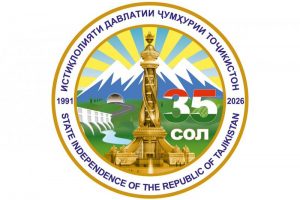 President Emomali Rahmon Approves Emblem for the 35th Anniversary of Tajikistan’s State Independence
President Emomali Rahmon Approves Emblem for the 35th Anniversary of Tajikistan’s State Independence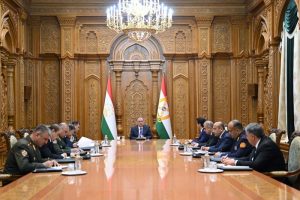 President Emomali Rahmon Holds Working Meeting with Heads of Security and Law Enforcement Agencies
President Emomali Rahmon Holds Working Meeting with Heads of Security and Law Enforcement Agencies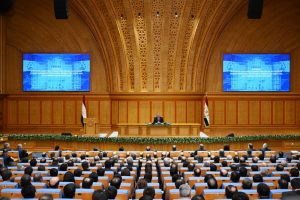 Expanded meeting of the Government of the Republic of Tajikistan
Expanded meeting of the Government of the Republic of Tajikistan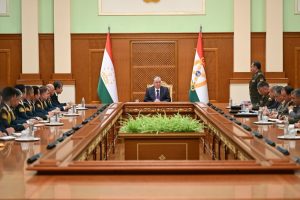 President Emomali Rahmon makes personnel appointments
President Emomali Rahmon makes personnel appointments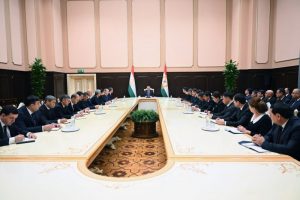 President Emomali Rahmon makes personnel changes in the structures of the Supreme Court, the Higher Economic Court, the Ministry of Foreign Affairs
President Emomali Rahmon makes personnel changes in the structures of the Supreme Court, the Higher Economic Court, the Ministry of Foreign Affairs President Emomali Rahmon makes personnel appointments in the structures of the Ministry of Internal Affairs
President Emomali Rahmon makes personnel appointments in the structures of the Ministry of Internal Affairs President Emomali Rahmon makes personnel appointments
President Emomali Rahmon makes personnel appointments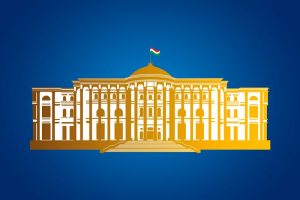 Commentary to orders of the President of the Republic of Tajikistan on the republican competitions «Tajikistan – My Dear Homeland», «Science – Dawn of Enlightenment» and «Book – Dawn of Knowledge» in 2026
Commentary to orders of the President of the Republic of Tajikistan on the republican competitions «Tajikistan – My Dear Homeland», «Science – Dawn of Enlightenment» and «Book – Dawn of Knowledge» in 2026 Emomali Rahmon, Vladimir Putin discuss strengthening strategic partnership between two countries
Emomali Rahmon, Vladimir Putin discuss strengthening strategic partnership between two countries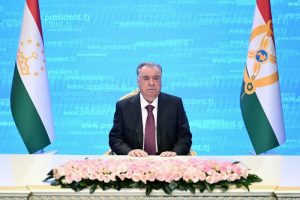 New Year Address of the President of Tajikistan to the Nation
New Year Address of the President of Tajikistan to the Nation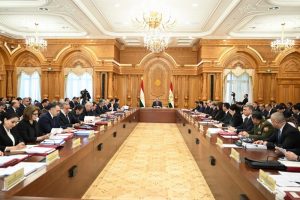 Meeting of the Government of the Republic of Tajikistan
Meeting of the Government of the Republic of Tajikistan














